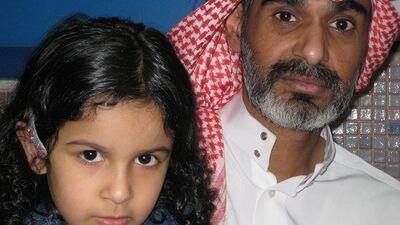RIYADH // The forced divorce of a Saudi couple after a complaint by the wife's brothers of alleged "tribal incompatibility" has been overturned, opening the way for them to resume living together, their lawyer and a rights activist said. Saudi Arabia's highest court has instructed a lower court to reverse its decision five years ago, in 2005, to force the annulment of the couple's marriage. The Supreme Court's ruling, issued yesterday, is regarded by human rights advocates as a boost for individual rights over tribal sentiments, which some Saudis say have been growing stronger in recent years.
Fawzia al Ayouni, who heads the Voice of Women advocacy group, said: "I consider this decision to be a milestone in Saudi modern history, as it loudly screams that we are all equal sons and daughters of this country, and tribalism should no longer govern our lives." The couple has not been officially notified of the new ruling, although "we have been hearing about it all day", said Mansour al Timani, 40, who was married to - and forcibly divorced from - Fatima 'Azzaz, 36.
He added that "it is up to the judges and government officials to tell us how to act next, we trust in them. All I want right now is to have my wife and son back." Ahmad K al Sudairy, the lawyer who assisted the couple, said he had presented a 20-page document to the royal court of King Abdullah with a petition for a review of the case. On August 30 last year, the king asked the Supreme Court to take another look at the decision of 2005. Now, that court has asked the lower court to reverse its divorce ruling, Mr al Sudairy said.
"This definitely is a ruling that changes many things, including the way courts examine cases presented to it, [and] the types of cases they accept," he said. "King Abdullah is restating that fact that rights are not something to meddle with, and that women can rest assured that justice will be served." Ms 'Azzaz was a schoolteacher in the eastern Saudi town of Khobar when Mr al Timani, a hospital administration employee, expressed an interest in marrying her.
As is customary here, Ms 'Azzaz's male relatives were dispatched to look into Mr al Timani's background. After visiting his hometown of Jouf, Mr al Timani said, they were satisfied with his reputation and most importantly, with his lineage, which is firmly rooted in the Shammar tribe. After two years of marriage, however, 'Azzaz's half-brothers began complaining that Mr al Timani had misled them about his tribal background. They claimed that it was beneath that of their family's.
Her half-brothers successfully petitioned a court in Jouf to annul the marriage on the grounds of "tribal incompatibility," forcing the couple to separate, since a divorced couple can no longer live together. In an interview last year, Mr al Timani said the court had not asked the couple their side of the story. He also denied misleading his wife's half-brothers, and claimed that they brought the case because of a dispute with Ms 'Azzaz over the inheritance left by their deceased father.
Alienated from her own family, Ms 'Azzaz refused to return to her family home and instead went to live in a state-run orphanage in Dammam. While there, she gave birth to the couple's second child, a boy. Mr al Timani, meanwhile, has been living in a rented apartment in Riyadh with their six-year-old daughter, Nuha. Mrs al Ayouni said she also regarded the court ruling as a setback for those who abuse the guardianship system, which gives men immense control over the lives of female relatives.
"This guardianship is a form of corruption that Islam did not bring or encourage," she said. Christophe Wilcke, senior Middle East researcher at the New York-based organisation Human Rights Watch, called the ruling "a great victory" not just for Ms 'Azzaz and Mr al Timani but also "for the many others in the same position, whose cases only came to light after [this case] gathered international attention." Mrs al Ayouni applauded Turki al Sudairy, former head of the state-appointed Human Rights Commission, for getting the commission involved in the case, and appointing Mr al Sudairy on a pro bono basis.
What "turned the case around was the fact that we put our hands on new documents refuting the brothers' case," Mr al Sudairy said. "We managed to prove that [Al Timani] was of tribal descent". @Email:cmurphy@thenational.ae

